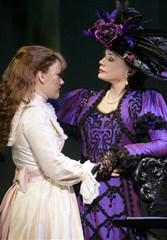| Opera Reviews | 26 April 2024 |
A delightful diversionby Sarah Noble |
|
| Sondheim: A Little Night Music Opera Australia Sydney Opera House 28 June 2010 |
|
|
Set in nineteenth century Sweden, the action of A Little Night Music turns on Désirée Armfeldt, famous actress and femme d'un certain âge, who arranges a toxic weekend party at her mother's country estate in the hopes of winning back her former flame, the now-married Fredrik Egerman. What ensues is a series of machinations and humiliations both preposterous and touching; and eventually, amidst the chaos, true love triumphs with poetic symmetry. Opera Australia's production is not quite revelatory. The piece, in which farcical romance vies with flashes of unsettling emotional insight, could certainly stand a more probing treatment than Stuart Maunder's rather frothy staging. But it's an enjoyable and musically excellent show which for the most part does justice both to the company and to Sondheim. Roger Kirk's sets are so economical one could be forgiven for thinking his budget had been blown on the frocks, which are many and lavish; but the space is generally used effectively, with only the Act I theatre scene muddled by its sparseness. Sigrid Thornton, of SeaChange fame, is a brittle Désiree, more convincing in quiet moments than in grand misbehaviour. In the show's runaway hit, "Send In the Clowns," she's truly poignant, giving a performance of such subtlety and grace that the inevitable rowdy applause which follows, while deserved, hardly seems appropriate. Anthony Warlow is magnetic as ever as a dapper, if slightly superficial Fredrik, his light baritone as stylish as ever. Lucy Maunder hasn't quite the soubrette charm (or top notes) for his pathologically virginal young wife, Anne, but when her kittenish tendencies are tamed she delivers a sincere portrayal which should settle as the season progresses. As Henrik, Fredrik's seminary-bound and perilously repressed son, Matthew Robinson could stand to cringe and quiver a little bit less, but his explosive "Later, Henrik" is powerfully delivered. Katrina Retallick is by turns hilarious and heartbreaking as Countess Charlotte, and gives one of the show's finest vocal performances, particularly in the beautiful "Every Day a Little Death". Kate Maree Hoolihan, as the maid Petra, delivers a virtuosic "Miller's Son," while stage veteran Nancye Hayes radiates class and charisma as the Wildean Madame Armfeldt, her understated "Liaisons" an object lesson in elegant wit. Ben Lewis amuses as a John Cleese-esque Count Carl-Magnus - his interactions with Warlow's Fredrik are especially fun - and Anthony Lawrence brings rustic appeal to his brief appearance as Frid. As the quintet of "Liebeslieders" - singers who weave their way through the show as a sort of Greek chorus - company regulars Jacqueline Dark, Kanen Breen, Katherine Wiles, Jane Parkin and Byron Watson are vocally luxurious, mingling operatic beauty with show tune savvy. It's a treat, too, to hear Sondheim's rich score so handsomely played, with conductor Andrew Greene leading the AOBO through its multifarious waltz (every single number is in some form of triple time) with warmth and sparkle. On the surface of it, Night Music might seem some of the lightest fare possible for an opera company. But the engaging complexity of its score and its witty, subtle love story are as affecting and impressive in their way as many so-called legitimate offerings. Opera is still what Opera Australia does best - but as diversions go, this is quite a delightful one. |
|
| Text ©
Sarah Noble Photo © Jeff Busby |

 There
are some works which teeter on the fence between opera and musical theatre.
A Little Night Music, which opened Opera Australia's winter season
last week, is not one of them - for all its period costumes and foreign
names, it is decidedly and gloriously a musical. Some might argue that
this is reason enough for an opera company to give it a wide berth,
evidently the management of Opera Australia are not among them, and
this genre-bending excursion is the company's most successful since
its superb Sweeney Todd in 2007. It's no coincidence that both
these shows were penned by the mighty Stephen Sondheim. A magician (some
would say god) of modern musical theatre, Sondheim's gift for the compassionate
dissection of the human heart upon the lyric stage rivals that of any
great operatic composer - and whose exquisite way with words leaves
many a librettist in the dust.
There
are some works which teeter on the fence between opera and musical theatre.
A Little Night Music, which opened Opera Australia's winter season
last week, is not one of them - for all its period costumes and foreign
names, it is decidedly and gloriously a musical. Some might argue that
this is reason enough for an opera company to give it a wide berth,
evidently the management of Opera Australia are not among them, and
this genre-bending excursion is the company's most successful since
its superb Sweeney Todd in 2007. It's no coincidence that both
these shows were penned by the mighty Stephen Sondheim. A magician (some
would say god) of modern musical theatre, Sondheim's gift for the compassionate
dissection of the human heart upon the lyric stage rivals that of any
great operatic composer - and whose exquisite way with words leaves
many a librettist in the dust. 





